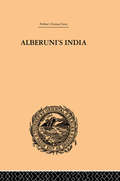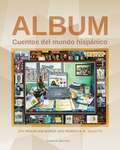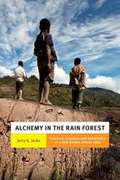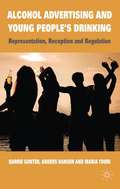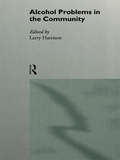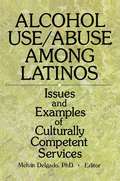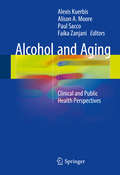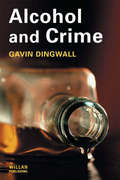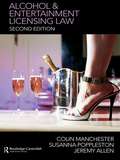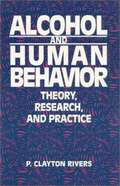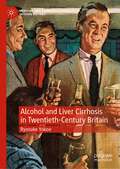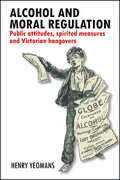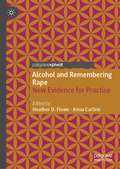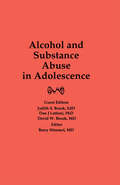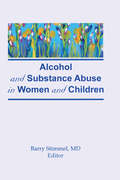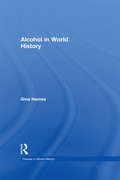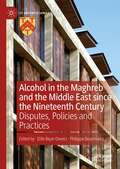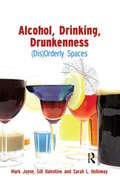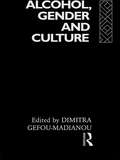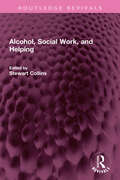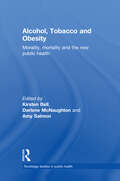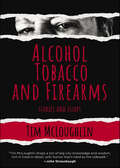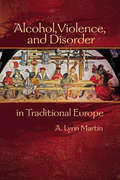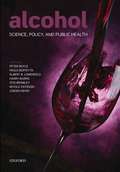- Table View
- List View
Alberuni's India: An Account of the Religion, Philosophy, Literature, Geography, Chronology, Astronomy, Customs, Laws and Astrology of India: Volume II
by Edward C. SachauThis is Volume X of eleven in a collection of India: History, Economy and Society. Originally published in 1910, this is the second part of an account of the religion, philosophy, literature, geography, chronology, astronomy, customs, laws and astrology of Alberuni's India about A.D. 1030.
Alchemy in the Rain Forest: Politics, Ecology, and Resilience in a New Guinea Mining Area
by Jerry K. JackaIn Alchemy in the Rain Forest Jerry K. Jacka explores how the indigenous population of Papua New Guinea's highlands struggle to create meaningful lives in the midst of extreme social conflict and environmental degradation. Drawing on theories of political ecology, place, and ontology and using ethnographic, environmental, and historical data, Jacka presents a multilayered examination of the impacts large-scale commercial gold mining in the region has had on ecology and social relations. Despite the deadly interclan violence and widespread pollution brought on by mining, the uneven distribution of its financial benefits has led many Porgerans to call for further development. This desire for increased mining, Jacka points out, counters popular portrayals of indigenous people as innate conservationists who defend the environment from international neoliberal development. Jacka's examination of the ways Porgerans search for common ground between capitalist and indigenous ways of knowing and being points to the complexity and interconnectedness of land, indigenous knowledge, and the global economy in Porgera and beyond.
Alcohol Advertising and Young People’s Drinking
by Barrie Gunter Anders Hansen Maria TouriThere is widespread and growing concern about the use of alcohol in society, especially by young people. Although overall volumes of alcohol consumption may be levelling off, the occurrences of excessive or 'binge' drinking, especially among teenagers and young adults, are increasingly commonplace. Tackling irresponsible drinking, which is linked to other antisocial behaviour and health problems, has focused attention on the promotion of alcohol by its producers as an important causal factor. This has led to calls for tougher regulation of alcohol marketing, including restrictions on where it can occur and the form it is allowed to take. Empirical research evidence, often emanating from government funded enquiries and endorsed by health lobbies, has been cited in support of an allegedly primary role played by advertising in triggering interest in and the onset of alcohol consumption among young people and in encouraging regular and heavy drinking. Close examination of this evidence, however, reveals that the research is not always as cut and dried as it may first appear. Methodological weaknesses abound in studies of the purported effects of alcohol advertising and other forms of marketing and the significance specifically of advertising as an agent that shapes young people's alcohol consumption could be weaker than often thought. This book sets out a review and critique of the evidence on alcohol advertising and marketing effects on young people and considers this evidence in relation to codes of advertising and marketing practice.
Alcohol Problems in the Community
by Larry HarrisonCommunity surveys reveal that about 6% of the adult male and 1% of the adult female population in England and Wales are drinking at high risk levels. Alcohol Problems in the Community examines the implications of recent community care legislation for government policy on alcohol. The first part of the book begins with a report on recent US research on the role of alcohol in the perpetration of child abuse and recent research on young people's drinking problems. This is followed by a study on the prevalence of drinking problems amongst older people which has been underestimated. In the second half of the book empirical evidence is presented on the particular difficulties faced by ethnic, migrant and homeless groups and this emphasis on the centrality of social disadvantage leads on to a consideration of a specific social work role in the assessment and management of alcohol-related problems. Alcohol Problems in the Community is aimed at social work practitioners and students on prequalifying, qualifying and postqualifying social work courses, and it addresses key social work issues in relation to poverty, homelessness, discrimination and drinking problems.
Alcohol Use/Abuse Among Latinos: Issues and Examples of Culturally Competent Services
by Melvin DelgadoIn Alcohol Use/Abuse Among Latinos: Issues and Examples of Culturally Competent Services, you will learn how to design and improve services for Latinos with substance abuse problems by understanding that the cultures and personal backgrounds of your clients are crucial to the counseling process. This text will also show you how these service skills apply to the individual, family, or an entire community. Studies show that, according to patients, culturally sensitive and responsive practitioners are generally more credible, trusted, and effective. Alcohol Use/Abuse Among Latinos takes into account several different aspects that will help you develop these traits and provide successful services for Latinos dealing with alcohol or other drug problems. You&’ll gain valuable insight into:the five elements that are vital to a successful ATOD (Alcohol, tobacco and Other Drug) service--multiculturism, resilience/strengths, competence, community capacity development, and community participation--plus a detailed explanation of why they are needed step-by-step instructions for using three methods, supervision, inservice training, and consultation, as means of providing ongoing learning of cross-cultural competencies to practitioners why key factors such as economic background, gender, and sexual orientation need to be taken into consideration for ATOD services to be effective demographic patterns and case studies of Latino users and abusers of alcohol and other drugs that illustrate the growing number of Latinos in need of ATOD services why the practitioner needs to be aware of how family importance, values attached to cooperation versus competition, sociability, respect, and action-oriented problem-solving play a role in effective services for Latinos the need for practitioners to understand how ethnic identity, biculturality, Spanish language fluency, gender-specific role expectations, skin color, and overall sense of self can affect the success of services for Latino teenagers how excessive marketing of alcohol to Latino communities, lack of representation, and a lack of community involvement are key barriers to successful ATOD services for LatinosAlcohol Use/Abuse Among Latinos also discusses Latino mens’and womens’individual needs concerning substance abuse. One of the topics addressed, the loss of self-esteem, has been found to be a contributing factor to alcohol use and abuse for Latinas. It offers ways you can promote self-esteem in your Latina clients by focusing on their cultural heritage and pride. In addition, this text takes a unique look Latina lesbians and how training through educational and agency internship programs can promote awareness to your clients&’ special needs concerning substance abuse. Alcohol Use/Abuse Among Latinos will help you provide all of your Latino clients with efficient and culture-friendly services for resisting or overcoming the abuse of alcohol, tobacco, or other drugs.
Alcohol and Aging: Clinical and Public Health Perspectives
by Alexis Kuerbis Alison. A. Moore Paul Sacco Faika ZanjaniThis book provides a current perspective on alcohol and aging to better understand the trends, costs, benefits, and clinical and community evidenced-based strategies. This book embraces not only the physical, cognitive, psychological, and social health benefits of moderate drinking in the elderly, it also delves into the risks of excessive drinking, including physical and psychiatric morbidity, neurodegeneration, medication complications, and accidents and injuries, and loss of independence. Written by experts in the field, this book is the only current text that includes the most current scientific, research, empirical, and practice information alongside a comprehensive review of the status of the field that will help guide alcohol use management and stimulate future research. Alcohol and Aging is the ultimate resource for all researchers, educators, clinicians, and professionals working with older adults who drink.
Alcohol and Crime
by Gavin DingwallAlcohol is massively associated with crime. Evidence from the British Medical Association found that alcohol use is associated with 60-70 per cent of murders, 70 per cent of stabbings, 50 per cent of fights or assaults in the home. For non-violent offences the association is very strong as well: 88 per cent of those arrested for criminal damage, 83 per cent for breach of the peace, 41 per cent for theft and 26 per cent for burglary, had drunk in the four hours prior to their arrest. At the same time there has been intense concern about public drunkenness in town and city centres, especially on the part of young people, and the cost and damage this causes. This book seeks to understand the nature of the connection between alcohol and crime, and the way the criminal justice system responds to the problem, providing a clear and accessible account and analysis of the subject. It draws upon a wide range of sources and research findings, and also sets the subject within a broader comparative context. It takes an interdisciplinary approach, and includes a sociological account of the role of alcohol in British society, a criminological analysis of the link between alcohol and crime and a philosophical consideration of individual responsibility for harm caused whilst intoxicated, and a legal analysis of different approaches that can be adopted as a response to alcohol-related offending.
Alcohol and Entertainment Licensing Law
by Colin Manchester Susanna Poppleston Jeremy AllenThis comprehensive and authoritative guide to licensing law is co-authored by the UK’s only professor of licensing law and two eminent licensing practitioners. It provides a detailed exposition and contextual analysis of the legal provisions governing the licensing of alcohol and entertainment under the Licensing Act 2003, encompassing both the legislative and decision-making framework of the Act as well as its implications for human rights. Fully updated and revised, it covers the various forms of authorization for licensable activities and licence and certificate conditions that might be attached as well as the enforcement and appeal provisions of the Act. This new edition, building on the highly acclaimed original work published in 2005, includes subsequent legislative changes and case law decisions. New additions to this edition include: expanded coverage of enforcement provisions and police powers a revised and extended chapter on appeals, in light of the practical and procedural developments that have evolved in the appeal process amendments to existing regulations and the revised Statutory Guidance issued in 2007. This book is essential reading for all local authorities, legal advisers, licensing policy advisors, operators and the police as well as those applying for licences.
Alcohol and Human Behavior: Theory, Research, and Practice
by P. Clayton RiversSurveys the critical issues discussed in the field, pointing out how each issue has been approached from several theoretical perspectives.
Alcohol and Liver Cirrhosis in Twentieth-Century Britain (Medicine and Biomedical Sciences in Modern History)
by Ryosuke YokoeThe relationship between alcohol consumption and liver cirrhosis has long been contested by doctors and medical professionals, creating numerous implications for the public reputation of alcohol in Britain. Despite this, it was not until the 1970s that cirrhosis came to be understood as an ‘alcoholic disease’. This book contextualises developments in this debate through the twentieth century by examining the significant influence that medical expertise had on policy responses to alcohol misuse, as well as the social reputation of alcohol consumption. It demonstrates how the degree to which drinking was seen to be responsible for liver disease directly shaped how different groups, such as the temperance movement and the drinks industry, exaggerated or downplayed the destructive properties of alcohol. Covering a series of themes including the science of disease causation, the social standing of medical expertise, and alcohol and public health policy, this book argues that in order to properly understand the trajectory of debates around drinking we need to consider the twentieth-century ‘alcohol problem’ as primarily a medical issue. Contrary to the tendency by existing works to disassociate perceptions and responses to alcohol use from the objective knowledge of its effects on the body, this book shows that medical understandings of liver disease influenced how alcohol was conceptualised in relation to its harms. Offering a fresh perspective on the interaction between scientific knowledge and policy during the twentieth century, this book provides insights for those researching the social, political and cultural history of modern Britain, as well as historians of medicine and health.
Alcohol and Moral Regulation: Public Attitudes, Spirited Measures and Victorian Hangovers
by Henry YeomansAlcohol consumption is frequently described as a contemporary, worsening and peculiarly British social problem that requires radical remedial regulation. Informed by historical research and sociological analysis, this book takes an innovative and refreshing look at how public attitudes and the regulation of alcohol have developed through time. It argues that, rather than a response to trends in consumption or harm, ongoing anxieties about alcohol are best understood as ‘hangovers’ derived, in particular, from the Victorian period. The product of several years of research, this book aims to help readers re-evaluate their understandings of drinking. As such, it is essential reading for students, academics and anyone with a serious interest in Britain’s ‘drink problem’.
Alcohol and Remembering Rape: New Evidence for Practice
by Anna Carline Heather D. FloweThis book examines how alcohol intoxication impacts upon the memory of rape victims and provides recommendations for how best to investigate and prosecute such rape complaints. An estimated 75% of victims are under the influence of alcohol during a sexual assault and yet there is surprisingly little guidance on conducting interviews with complainants who were alcohol-intoxicated during the attack. This book will provide a distinctive, rigorous and important contribution to knowledge by reviewing the evidence base on the effects of alcohol on memory performance. The book brings together a range of academics from various disciplines, including psychology, law and criminology, and it discusses the implications for practice based on consultation with various criminal justice practitioners, including police officers, barristers who defend and prosecute rape cases and policy makers.
Alcohol and Substance Abuse in Adolescence
by Barry Stimmel Judith BrookThis timely volume explores the possible reasons that young people turn to drugs, the most effective methods to manage those who are afflicted, and ways to educate youth to prevent their initial drug involvement.
Alcohol and Substance Abuse in Women and Children
by Barry StimmelHere is a timely volume that examines the problems of substance abuse in women and children, with a particular emphasis on the role played by the family in the development and perpetuation of the problem.
Alcohol in World History (Themes in World History)
by Gina HamesFrom the origins of drinking to the use and abuse of alcohol in the present day, this global historical study draws on approaches and research from biology, anthropology, sociology and psychology. Topics covered include: the impact of colonialism alcohol before the world economy industrialization and alcohol globalization, consumer society, and alcohol. Gina Hames argues that the production, trade, consumption, and regulation of alcohol have shaped virtually every civilization in numerous ways. It has perpetuated the development of both domestic and international trade; helped create identity and define religion; provided a tool for oppression as well as a tool for cultural and political resistance; and has supplied governments with essential revenues as well as a means of control over minority groups. Alcohol in World History is one of the first studies to pull together such a wide range of sources in order to compare the role of alcohol throughout time and across both western and non-western civilizations.
Alcohol in the Maghreb and the Middle East since the Nineteenth Century: Disputes, Policies and Practices (St Antony's Series)
by Elife Biçer-Deveci Philippe BourmaudThis book explores the significance of alcohol in the Middle East and Maghreb as a powerful catalyst of social and political division. It shows that the solidarities and polarities created by disputes over alcohol are built on arguments far more complex than oppositions on religion or consumption alone. In a region in which alcohol is banned by Islamic rules, yet allows its production and consumption, alcohol has always been contentious. However, this volume examines the different forms of social authority – religious, cultural and political – to offer a new understanding of drinking behaviours in the Middle East and North Africa. It suggests that alcohol, being at the same time an import and product of local industry, epitomises the tensions inherent to the conforming of Islamic societies to global trends, which seek to redefine political communities, social hierarchies and gender roles. The chapters challenge common misconceptions about alcohol in this region, arguing instead that medical discourses on alcohol dependency hide stances on national independence in an imperialist context; that the focus on religion also tends to conceal disputes on alcohol as a social struggle; and that disputes on inebriation are more about masculinity than judging private leisure. In doing so, the volume presents alcohol as a way of grasping the power relations that structure the societies of the Middle East and Maghreb.
Alcohol, Drinking, Drunkenness: (Dis)Orderly Spaces (Studies In Early Medieval Britain Ser.)
by Gill Valentine Sarah L. Holloway Mark JayneWhile disciplines such as anthropology, sociology, politics, social policy and the health and medical sciences have a tradition of exploring the centrality of alcohol, drinking and drunkenness to people's lives, geographers have only previously addressed these topics as a peripheral concern. Over the past few years, however, this view has begun to change, accelerated by an upsurge in interest in alcohol consumption relating to political and popular debate in countries throughout the world. This book represents the first systematic overview of geographies of alcohol, drinking and drunkenness. It asks what role alcohol, drinking and drunkenness plays in people's lives and how space and place are key constituents of alcohol consumption. It also examines the economic, political, social, cultural and spatial practices and processes that are bound up with alcohol, drinking and drunkenness. Designed as a reference text, each chapter blends theoretical material with empirical case studies in order to analyse drinking in public and private space, in the city and the countryside, as well as focusing on gender, generations, ethnicity and emotional and embodied geographies.
Alcohol, Gender and Culture (European Association of Social Anthropologists)
by Dimitra Gefou-MadianouEuropeans consitiute 12 and a half per cent of the world's population but consume 50 per cent of the recorded world production alcohol, and this consumption plays a significant role in the cultural, religious, and social identites of these countrise. The contributors show how different groups define the proper use of alcohol, how State policies may effect drinking behaviour, and highlight how beverages and comestibles must be seen in relation to each other. From this is it shown how importamt socio-cultural distinctions are made between and within communities, gender relations, ethnic groups, and socio-economic groups, and within religious ideologies; what one drinks, how one drinks, with whom, and where, all influence not how alcoholic substances are regarded but how social relations are experienced. Alcohol Gender and Culture clearly demonstrates how the social construction of drinking may provide an analytical tool with which to approach different socio-cultural groups and illustrates how any cultural group can be compared to another by its attutudes to alcohol. It will be invaluable reading for students and lecturers af anthropology, cultural history and gender studies.
Alcohol, Social Work, and Helping (Routledge Revivals)
by Stewart CollinsFirst published in 1990, Alcohol, Social Work and Helping provides coherent and imaginative advice on how to counsel the growing number of clients whose use of alcohol causes of problems. It locates intervention within societal and agency contexts and tackles such practical issues as: how to work with a problem drinker; which short-term goals to suggest; what kind of help to apply; and how to assist in the event of a relapse. The contributors, with backgrounds in academic, statutory, and voluntary settings, focus on key areas of intervention, family, and group contexts, and there is a chapter on the particular circumstances and needs of women. All relevant information – both general and specialized – is presented in a clear, easy-to-read style, and is aimed at developing existing knowledge and skills. This book will be of interest to students of health, social work, and sociology.
Alcohol, Tobacco and Obesity: Morality, mortality and the new public health
by Amy Salmon Kirsten Bell Darlene McNaughtonAlthough drinking, smoking and obesity have attracted social and moral condemnation to varying degrees for more than two hundred years, over the past few decades they have come under intense attack from the field of public health as an 'unholy trinity' of lifestyle behaviours with apparently devastating medical, social and economic consequences. Indeed, we appear to be in the midst of an important historical moment in which policies and practices that would have been unthinkable a decade ago (e.g., outdoor smoking bans, incarcerating pregnant women for drinking alcohol, and prohibiting restaurants from serving food to fat people), have become acceptable responses to the 'risks' that alcohol, tobacco and obesity are perceived to pose. Hailing from Canada, Australia, the United Kingdom and the USA, and drawing on examples from all four countries, contributors interrogate the ways in which alcohol, tobacco and fat have come to be constructed as 'problems' requiring intervention and expose the social, cultural and political roots of the current public health obsession with lifestyle. No prior collection has set out to provide an in-depth examination of alcohol, tobacco and obesity through the comparative approach taken in this volume. This book therefore represents an invaluable and timely contribution to critical studies of public health, health inequities, health policy, and the sociology of risk more broadly.
Alcohol, Tobacco, and Firearms: Stories and Essays
by Tim McLoughlinAn enthralling collection of short fiction and nonfiction that draw upon McLoughlin's three-decade career in the criminal justice system.“A wistful Irish sensibility and memories from a 30-year career as a peace officer in the New York City criminal justice system haunt this solid collection . . . With spare prose, McLoughlin creates memorable vignettes of urban life. Fans of Kent Anderson’s Liquor, Guns & Ammo will want to check this out.” —Publishers Weekly“Alcohol, Tobacco, and Firearms couldn’t be more New York. Tim McLoughlin drops a ton of big-city knowledge and wisdom, rich in lived-in detail, with humor that’s hard as the sidewalk.” —John Strausbaugh, author of City of SeditionIn Alcohol, Tobacco, and Firearms, Tim McLoughlin draws upon his three-decade career in the criminal justice system with his characteristic wit and his fascination with misfits and malfeasance. A lifetime immersed in New York City feeds short stories that evoke a landscape of characters rife with personal arrogance and misjudgment; and nonfiction essays about toeing the line when the line keeps disappearing. An opioid-addicted catsitter electronically eavesdrops on his neighbors only to hear devastating truths. A degenerate gambler stakes his life on a long shot because he sees three lucky numbers on the license plate of a passing car. In the nonfiction essays, we learn that the system plays a role in supporting vice, as long as it gets a cut. Altar boys compete to work weddings and funerals for tips in the shadow of predatory priests. Cops become robbers, and a mob boss just might be a civil rights icon. McLoughlin shines a light on worlds that few have access to. A recurring theme in his urban, often New York–centric work is chronic displacement, people standing still in a city that is always changing. These are McLoughlin’s ghosts, these casualties of progress, and he holds them dear and celebrates them.
Alcohol, Violence, and Disorder in Traditional Europe (Early Modern Studies #2)
by A. Lynn MartinTraditional Europe had high levels of violence and of alcohol consumption, both higher than they are in modern Western societies, where studies demonstrate a link between violence and alcohol. A. Lynn Martin uses an anthropological approach to examine drinking, drinking establishments, violence, and disorder, and compares the wine-producing south with the beer-drinking north and Catholic France and Italy with Protestant England, and explores whether alcohol consumption can also explain the violence and disorder of traditional Europe.Both Catholic and Protestant moralists believed in the link, and they condemned drunkenness and drinking establishments for causing violence and disorder. They did not advocate complete abstinence, however, for alcoholic beverages had an important role in most people's diets. Less appreciated by the moralists was alcohol's function as the ubiquitous social lubricant and the increasing importance of alehouses and taverns as centers of popular recreation.The study utilizes both quantitative and qualitative evidence from a wide variety of sources to question the beliefs of the moralists and the assumptions of modern scholars about the role of alcohol and drinking establishments in causing violence and disorder. It ends by analyzing the often-conflicting regulations of local, regional, and national governments that attempted to ensure that their citizens had a reliable supply of good drink at a reasonable cost but also to control who drank what, where, when, and how.No other comparable book examines the relationship of alcohol to violence and disorder during this period.
Alcohol, Violence, and Disorder in Traditional Europe (Early Modern Studies)
by A. Lynn MartinTraditional Europe had high levels of violence and of alcohol consumption, both higher than they are in modern Western societies, where studies demonstrate a link between violence and alcohol. A. Lynn Martin uses an anthropological approach to examine drinking, drinking establishments, violence, and disorder, and compares the wine-producing south with the beer-drinking north and Catholic France and Italy with Protestant England, and explores whether alcohol consumption can also explain the violence and disorder of traditional Europe.Both Catholic and Protestant moralists believed in the link, and they condemned drunkenness and drinking establishments for causing violence and disorder. They did not advocate complete abstinence, however, for alcoholic beverages had an important role in most people's diets. Less appreciated by the moralists was alcohol's function as the ubiquitous social lubricant and the increasing importance of alehouses and taverns as centers of popular recreation.The study utilizes both quantitative and qualitative evidence from a wide variety of sources to question the beliefs of the moralists and the assumptions of modern scholars about the role of alcohol and drinking establishments in causing violence and disorder. It ends by analyzing the often-conflicting regulations of local, regional, and national governments that attempted to ensure that their citizens had a reliable supply of good drink at a reasonable cost but also to control who drank what, where, when, and how.No other comparable book examines the relationship of alcohol to violence and disorder during this period.
Alcohol: Science, Policy and Public Health
by Paolo Boffetta Peter Boyle Albert B. Lowenfels Harry Burns Otis Brawley Witold Zatonski Jürgen RehmAlcohol has always been an issue in public health but it is currently assuming increasing importance as a cause of disease and premature death worldwide. Alcohol: Science, Policy, and Public Health provides an interdisciplinary source of information that links together, the usually separate fields of, science, policy, and public health. This comprehensive volume highlights the importance of bringing scientific knowledge to bear in order to strengthen and develop alcohol public policy. The book looks at the historical evolution of alcohol consumption in society, key early studies of alcohol and disease, and the cultural and social aspects of alcohol consumption. It then goes on to cover the chemistry and biology of alcohol, patterns of consumption, gender and age-related issues, alcohol and injury, alcohol and cancer and non-malignant disease, and various current therapeutic aspects. The book concludes with a section on alcohol policy, looking at issues of poverty, the availability of alcohol and alcohol control measures. This major reference, written by international leaders in the fields of alcoholism and alcohol policy, provides a comprehensive study of one of the foremost health problems in the world, and represents the highest standards of research within the field. It will be valuable to physicians and health professionals involved with patients with alcohol-related problems, scientists, public health specialists, health policy specialists, researchers and legislators as well as students of public health.
